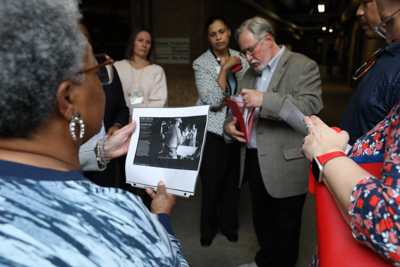Charting a path towards health equity: MEWI's Community Advisory Board explores UMMC's history

MEWI believes that the road to a healthier, more equitable future is paved with a deep understanding of the past. That's why the institute's Community Advisory Board (CAB) recently embarked on the History Happened Here Walking Tour of the University of Mississippi Medical Center (UMMC) campus, led by Dr. Ralph Didlake. Currently, Dr. Didlake is Professor of Surgery and Director of the Center for Bioethics and Medical Humanities. His current focus is professionalism education, research ethics, and the medical humanities.
This enlightening journey took the CAB members through both the highs and lows that have defined UMMC's storied history in Mississippi. From the site of the state's first lung and heart transplants to the very room where civil rights icon Medgar Evers drew his last breath, the tour provided a poignant reminder of the institution's complex past and its enduring impact on the people of this state.
"This experience was truly impactful," says CAB Chair Nic Lott. "Seeing firsthand the triumphs and tragedies that have unfolded at UMMC underscores the critical importance of our work at MEWI. It's a powerful reminder that health equity cannot be achieved without reckoning with the past."
As the community-facing component of the John D. Bower School of Population Health, MEWI is on a mission to transform health outcomes in Mississippi. And the CAB, with its diverse perspectives and deep community roots, plays a vital role in guiding this transformative vision.
"The CAB's tour of UMMC's history will undoubtedly shape our path forward," says Dr. Abigail Gamble, MEWI's director of research and community engagement. "By confronting the complex legacy of this institution, we can better understand the systemic barriers that have contributed to health disparities and develop more effective, community-driven solutions."
Indeed, this powerful experience has reinforced MEWI's commitment to uplifting the voices of vulnerable populations, addressing social determinants of health, and fostering inclusive partnerships that drive meaningful, lasting change.
As the institute continues its work to create a healthier, more equitable Mississippi, the CAB's newfound insights will serve as a critical guidepost, ensuring that MEWI's efforts remain grounded in the realities of the past and the aspirations of the future.
To learn more about MEWI's Community Advisory Board and its role in shaping the institute's vision, visit the CAB's page or contact Dr. Gamble at agamble2@umc.edu.


